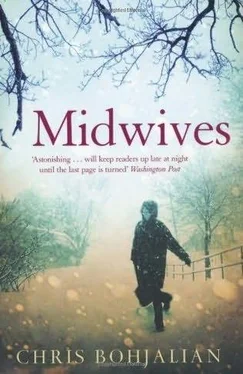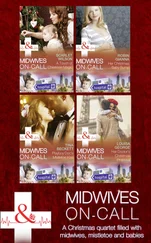Chris Bohjalian - Midwives
Здесь есть возможность читать онлайн «Chris Bohjalian - Midwives» весь текст электронной книги совершенно бесплатно (целиком полную версию без сокращений). В некоторых случаях можно слушать аудио, скачать через торрент в формате fb2 и присутствует краткое содержание. Жанр: Современная проза, на английском языке. Описание произведения, (предисловие) а так же отзывы посетителей доступны на портале библиотеки ЛибКат.
- Название:Midwives
- Автор:
- Жанр:
- Год:неизвестен
- ISBN:нет данных
- Рейтинг книги:5 / 5. Голосов: 1
-
Избранное:Добавить в избранное
- Отзывы:
-
Ваша оценка:
- 100
- 1
- 2
- 3
- 4
- 5
Midwives: краткое содержание, описание и аннотация
Предлагаем к чтению аннотацию, описание, краткое содержание или предисловие (зависит от того, что написал сам автор книги «Midwives»). Если вы не нашли необходимую информацию о книге — напишите в комментариях, мы постараемся отыскать её.
Midwives — читать онлайн бесплатно полную книгу (весь текст) целиком
Ниже представлен текст книги, разбитый по страницам. Система сохранения места последней прочитанной страницы, позволяет с удобством читать онлайн бесплатно книгу «Midwives», без необходимости каждый раз заново искать на чём Вы остановились. Поставьте закладку, и сможете в любой момент перейти на страницу, на которой закончили чтение.
Интервал:
Закладка:
Stephen touched a tip of the napkin to his tongue and then rubbed the moist paper over an ink smudge on the back of his hand. "Think so?"
"Yeah, I do. Don't you?"
Stephen looked at the skin on his hand and folded the napkin again and again until it was roughly the size of a quarter. "It seemed a lot worse to you than it was. The jury doesn't know that he and his wife had one of those bad outcomes."
The food on my father's plate, a grilled cheese and coleslaw, looked exactly as it had when the waitress brought us our lunches. The sandwich remained a pair of flat, butter-burned triangles, and the mound of coleslaw still held its ice-cream-scoop shape.
"What about that doctor?"
"Lang? I thought we went at it pretty good."
Peter signaled for the waitress to bring the check to our booth.
"I wish we'd done more."
"I made sure the jury understood that every word he said was conjecture. And I made sure they realized the guy never even saw the woman's body. Tell me, what more would you have wanted?" There was no edge to Stephen's question, no trace of irritation.
"He was a horse's ass. I wish we'd made that clear."
Stephen nodded, letting my father's frustration roll over him like a wave. When he saw the waitress drop the bill on the table by Peter, he reached inside his suit jacket for his wallet.
"Well, we'll get 'em this afternoon then," he said, and he sounded to me like my high-school track coach.
"Look," my mother said, her voice strangely groggy as she gazed out the window at Lake Memphremagog. "There must be something flat floating out there. Look at the seagulls."
Perhaps a hundred yards into the lake, dozens of seagulls were standing on the surface of the water-not floating or bobbing as one might expect, but standing with their small legs extended below them on pieces of driftwood. We all turned, and as I did I looked at my mother's eyes, and something about them suggested she hadn't heard a word my father and Stephen had said.
Chapter 18.
I doubt I'll ever talk to Anne again, so I guess I'll always be wondering: What did she think would happen when she picked up the phone and called B.P. Hewitt? Did she expect something different? Or did she get what she wanted?
– from the notebooks of Sibyl Danforth, midwife
ANNE AUSTIN HAD NOT worked with my mother for very long, and so she had not become a part of our lives the way her predecessors had. Heather Reed, for example, was no substitute for a big sister, but she spent close to six years on the periphery of our family-days and days doing prenatals in the room off the kitchen, dinners at our house almost weekly, the evenings she would baby-sit me when my mother and father would be out someplace together-and there was little of importance I wouldn't have shared with her when I was in elementary school. Heather always seemed to know when I'd been fighting with Rollie or Sadie, she was an unfailing source of help with my homework, and she was a strong shoulder in times of trouble.
But I had barely known Anne Austin when Charlotte Bedford died. Over the years it has become difficult for me to differentiate my opinion of the woman after the turmoil from my opinion of her before it, and to remember that I did not always despise her. But the fact is, Anne had only been a part of our lives for one winter when Charlotte died; she had only been assisting my mother since the previous December. She'd had dinner at our house two or three times, and on occasion I'd seen her coming and going on those days my mother had pregnant women stopping by for their checkups. She had struck me, I believe, as a sweet but mousy thing with brown hair she kept short: the sort of woman I came across once in a while in college who would trade a party on a Saturday night for an evening bent over books in the science library, yet would still fail to do very well on the exam. The trade, more often than not, was triggered by shyness rather than drive, and an organic chemistry test was merely a reasonable excuse to avoid loud music and aggressive boys.
But I don't think when I first met Anne I thought she was self-righteous or smug; I don't think I thought she had it in for my mother. That impression grew during the summer and fall as my mother's trial approached, and I'd hear the adults discussing once more what had occurred the night of the thirteenth and the morning of the fourteenth.
"And that's when you broke her water," Stephen said to my mother on one of those occasions, referring to Charlotte, when the two of them were alone in the kitchen.
"That's right."
"And what did Anne ask?"
"She didn't ask anything."
"But she said something…"
"She said, 'I don't understand why you did that.'"
"And it wasn't meant as the sort of question an apprentice might ask her midwife? It wasn't a… a part of the learning process?"
"No. She was irritated with me. She thought I was intervening."
"Intervening?"
"Interfering with the natural process."
"Was that the first time she had gotten mad at you?"
"She didn't get mad at me. She was just annoyed."
"First time?"
My mother laughed. "Good Lord, no!"
"She was often annoyed with you?"
"Anne has just read too many books and been around too few births," my mother said, and although I was listening from a perch on the steps in the front hall, I was sure she was rolling her eyes.
Anne was twenty-two when she came to my mother, and until that winter she hadn't seen a baby crown or caught a newborn once in her life. But she had visions in her mind of what a perfect birth was like, and it was clear from the dinners we shared that she had indeed read copiously about the subject. Under my mother's tutelage she studied hard, and my mother thought she was a fine apprentice, despite Anne's periodic frustration with what she viewed as my mother's tendency to intervene. Anne wanted desperately to become a midwife, and there was no reason to believe that someday she wouldn't succeed.
By the time the trial began, however, she had grown in my mind from a mousy little midwife-wannabe to an arrogant traitor of almost theatric proportions: pietistic, self-important, and-for reasons I couldn't fathom-bent upon the destruction of my family. She had left Vermont the weekend Charlotte Bedford died, apparently coming back only twice before the trial: once for a deposition and once to pack up the possessions she had left in the room she was renting from a college professor in Hardwick.
But when she had first phoned B.P. Hewitt-my mother's backup physician-six and a half months earlier, I doubt she hated my mother. I doubt she hated her even after B.P. tried to reassure her that she had not witnessed a cesarean on a living woman. When she picked up her phone to call the physician, I tend to doubt she even understood the fusion she was about to trigger, the linear progression of events she was about to unleash-a progression which, in hindsight, could not possibly have had a good end for my family. But for all I know, her intentions may even have been kind, her desires noble: A woman was dead, and something had to be done.
Yet the stakes must have grown large for Anne Austin that morning, and I would not be surprised if even today she cannot fully explain why she did what she did. Perhaps she thought that B.P. would share her first phone call with my mother, and that would effectively end her apprenticeship. After all, how could my mother ever trust Anne again after she had called her backup physician behind her back?
And so she had to convince herself that she was right, my mother was wrong. She'd call Asa Bedford, find out what he'd seen. And then, once she had broached her fears to the husband, fears reinforced by his own horrific memories-spurts of blood from the woman on the bed-she had to call the state's attorney. She had to. Perhaps she feared that the reverend would if she didn't, and then she herself might be charged as an accessory to a crime. She was, after all, the midwife's apprentice. She'd even gone with Asa to get the knife.
Читать дальшеИнтервал:
Закладка:
Похожие книги на «Midwives»
Представляем Вашему вниманию похожие книги на «Midwives» списком для выбора. Мы отобрали схожую по названию и смыслу литературу в надежде предоставить читателям больше вариантов отыскать новые, интересные, ещё непрочитанные произведения.
Обсуждение, отзывы о книге «Midwives» и просто собственные мнения читателей. Оставьте ваши комментарии, напишите, что Вы думаете о произведении, его смысле или главных героях. Укажите что конкретно понравилось, а что нет, и почему Вы так считаете.











